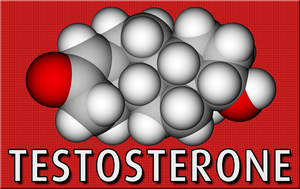Video Link: https://vimeo.com/282905511
Video Download: Click Here To Download Video
Video Stream: Click Here To Stream Video
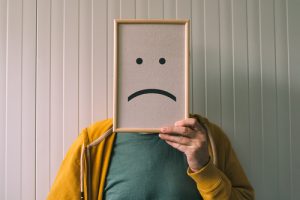 Anxiety is a major health issue that impacts male health at a psychological as well as a physiological level.
Anxiety is a major health issue that impacts male health at a psychological as well as a physiological level.
Generalized Anxiety Disorder is a medical condition that is characterized by apprehension, subconscious hyperactivity, physical tension, and hyper-awareness.
Symptoms of subconscious hyperactivity include elevated pulse, flushing, dizziness, dry mouth, clammy palms, heart palpitations, and sweating. Physical tension includes sighing, muscle aches, and restlessness.
Hyper awareness includes morning exhaustion, issues with sleep, insomnia, focus issues, irritability, distractibility, edginess, and hypervigilance.
Apprehension includes the whole bound of things which prevent us from being ourselves, including an intense worry about what other people think, unfounded fear in one's daily life, and excessive worrying about the welfare of oneself or others.
What is Anxiety?
Anxiety expresses itself in many different ways, but it can be described most succinctly as an overwhelming sense of worry or anxiety that gets in the way of living one's life as he or she wishes it to be. Anxiety can be absolutely debilitating, and there is powerful evidence that Testosterone Deficiency contributes to worry and anxiety.
What are the Symptoms of Anxiety?
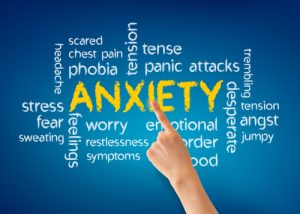 Low-T has been associated with a number of different issues that are related to Anxiety and Generalized Anxiety Disorder.
Low-T has been associated with a number of different issues that are related to Anxiety and Generalized Anxiety Disorder.
Both research and field study has shown that men with Low Testosterone are more likely to experience the following symptoms:
Mood Swings
Nervousness
Irritability
Anxiety
Depression
Inhibited Sense of Well-Being
How are Anxiety and Low-T Related?
Researchers and clinicians have long been aware of these symptoms, and they have been established in the medical record since at least 1946. In a 1946 study, researchers discovered the following:
Around 1/3 of men with Low-T experience issues with worrying
4 out of 10 experienced fear
½ of men with Hypogonadism was easily excitable
56% struggled with uneasiness and dread
4 out of 5 were irritable
9 out of 10 experienced high levels of nervousness
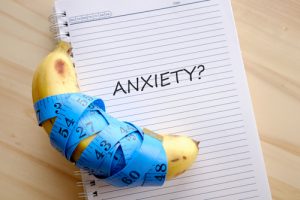 These numbers are much higher than normal, and researchers found that by treating these patients with bio-identical Testosterone, it was possible to alleviate their anxiety and improve their quality of life. In many cases, the symptoms completely disappeared!
These numbers are much higher than normal, and researchers found that by treating these patients with bio-identical Testosterone, it was possible to alleviate their anxiety and improve their quality of life. In many cases, the symptoms completely disappeared!
Women Need Testosterone Too
Did you know that women also have a distinct need for Testosterone? Women produce significantly less of the hormone than men, but it still plays an important role in their health and wellness.
There is even strong evidence that feminine Low-T contributes to heightened anxiety in female patients.
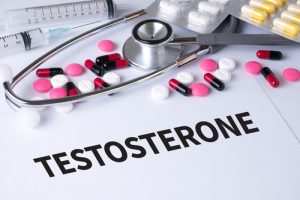 There is evidence that, for women with Low-T that suffer from anxiety, two months of Testosterone treatment was enough to mitigate the effects of anxiety for many patients, bringing them closer to a baseline psychological profile.
There is evidence that, for women with Low-T that suffer from anxiety, two months of Testosterone treatment was enough to mitigate the effects of anxiety for many patients, bringing them closer to a baseline psychological profile.
Estradiol was effective at reducing anxiety on its own, but, when combined with Testosterone, the results improved dramatically.
How Does Testosterone Affect Anxiety?
There are a lot of anxiety studies that simply can't be performed on humans, but animal research helps fill the gap in our knowledge. According to research conducted on lab rats, Testosterone interacts with the hippocampus in a positive way.
Lab rats without Testosterone had trouble learning and experienced high levels of anxiety, but similar lab rats treated with 3-Alpha-diol, DHT, or Testosterone experienced enhanced learning and mitigated anxiety.
Another similar study produced similar results, and there is broadening evidence that strongly supports the notion that Testosterone and other Androgens interact with the Hippocampus in a manner which reduces anxiety.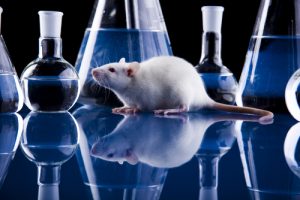
On the other hand, there is evidence that Testosterone primarily impacts subconscious fear, which is, of course, related to expressed fear and anxiety, but not directly.
Low-T patients that were treated with Testosterone were shown to be less liable to experience unconscious fear in a surprise situation than their control counterparts.
Testosterone Deficiency and Depression
Low-T is also associated with an increased incidence of depression and moodiness. Depression is defined clinically by the expression of symptoms. Symptoms of Depression include:
Reduced libido and desire
Issues with indecisiveness, focus, and controlled thought
Feelings of guilt and worthlessness
Fatigue
Irritability or reduced response to a stimulus
Excessive sleep, insomnia, suppressed hunger, or weight loss
Thoughts of suicide or death
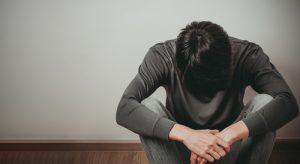 Testosterone Deficiency sometimes leads both to mild feelings of depression, as well as an increased incidence of clinically-diagnosed depression.
Testosterone Deficiency sometimes leads both to mild feelings of depression, as well as an increased incidence of clinically-diagnosed depression.
Low-T Increases the Likelihood of Experiencing Depression
Of course, Depression can occur on its own, but Testosterone Deficiency is a contributing factor for many patients.
Also, the younger a man is when he experiences Low-T, the more likely he is to experience symptoms of Depression. Low-T patients treated with Testosterone patches, pills, or injections were alleviated of depression, but the administration of Testosterone had no effect on patients with normal Testosterone levels.
Depression is Complicated
Depression is a complex disorder which is the end result of a multitude of factors which weigh down the individual, including, but not limited to stress, diet, alcohol use, smoking, obesity, and mental illness, all of which make the Low-T individual more likely to experience Depression.
It is not completely clear which Low-T patients benefit most with regard to psychological health when it comes to Low-T treatment, but there is clinical evidence that Testosterone injections have a significant and perceptible effect on mood when taken for six weeks.
Impact of DHEA on Mood
In addition to Testosterone, DHEA also has a positive impact on mood. In addition to being the precursor hormone which is eventually converted into Testosterone and Estrogen (depending on sex), the hormone also has a controlling influence on levels of GABA in the brain, and has the ability to control and uplift mood as a direct result.
There is also evidence that the presence of DHEA in the brain suppresses the activity of Pregnenolone, a hormone associated with Depression and anxiety.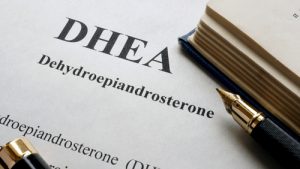
DHEA supplementation was found to have a positive effect on both psychological and physical well-being in both sexes. 84% of women experienced improvement, whereas 67% of men experienced improvement.
Enhanced well-being in this context is defined as the improved capacity to handle stress, increased relaxation, uplifted mood, sounder sleep, and increased energy.
If You are Experiencing Depression and Anxiety as You Grow Older, You May Benefit from Testosterone Therapy!
As you can see, Testosterone and DHEA are not only hormones that promote sexual health, they also play an important role in sustaining psychological health in both sexes.
If you are growing older and experiencing increased issues related to anxiety, as well as other symptoms which are inhibiting your quality of life, you may be suffering from Andropause, and Testosterone therapy may be able to improve your quality of life as well as your health!
Contact Us Today For A Free Consultation

- Adverse Effects of Testosterone Therapy in Adult Men: A Systematic Review and Meta-Analysis [Last Updated On: July 2nd, 2024] [Originally Added On: June 4th, 2010]
- Low Testosterone Levels, Foods That Increase Testosterone Levels wwwSelf-Improvement-Bible.com [Last Updated On: November 12th, 2023] [Originally Added On: May 30th, 2011]
- Low Testosterone in Men: The Next Big Thing in Medicine! - Abraham Morgentaler, MD [Last Updated On: May 7th, 2023] [Originally Added On: June 3rd, 2011]
- How To Determine Testosterone Levels By Looking At Your Ring Finger [Last Updated On: December 7th, 2017] [Originally Added On: June 30th, 2011]
- Prolab Horny Goat Weed Testosterone Booster Supplement Review [Last Updated On: November 23rd, 2023] [Originally Added On: July 19th, 2011]
- The Healthy Skeptic: Products make testosterone claims [Last Updated On: August 13th, 2024] [Originally Added On: September 11th, 2011]
- How To Naturally Increase Testosterone [Last Updated On: November 21st, 2023] [Originally Added On: September 28th, 2011]
- Testosterone Production - Video [Last Updated On: November 25th, 2024] [Originally Added On: November 20th, 2011]
- Testosterone makes us less cooperative and more egocentric, study finds [Last Updated On: January 23rd, 2018] [Originally Added On: February 1st, 2012]
- Testosterone makes us less cooperative and more egocentric [Last Updated On: January 24th, 2018] [Originally Added On: February 1st, 2012]
- Too much testosterone makes for bad decisions, tests show [Last Updated On: May 4th, 2015] [Originally Added On: February 1st, 2012]
- Today in Research: Testosterone's Negative Effects; Diet Soda Death [Last Updated On: January 2nd, 2018] [Originally Added On: February 2nd, 2012]
- Testosterone drives ego, trips cooperation [Last Updated On: December 2nd, 2017] [Originally Added On: February 4th, 2012]
- FDA approves BioSante/Teva's testosterone gel [Last Updated On: May 4th, 2015] [Originally Added On: February 15th, 2012]
- 'Manly' Fingers Make For Strong Jawline in Young Boys [Last Updated On: December 1st, 2017] [Originally Added On: February 15th, 2012]
- Teva, BioSante Win U.S. Approval for Testosterone Therapy [Last Updated On: December 10th, 2017] [Originally Added On: February 15th, 2012]
- BioSante Gains on Approval of Testosterone Gel: Chicago Mover [Last Updated On: January 8th, 2018] [Originally Added On: February 16th, 2012]
- BioSante soars following drug approval from FDA [Last Updated On: December 26th, 2017] [Originally Added On: February 16th, 2012]
- Antibodies, Not Hard Bodies: The Real Reason Women Drool Over Brad Pitt [Last Updated On: December 24th, 2017] [Originally Added On: February 21st, 2012]
- Almark Publishing Releases Book From Mark Rosenberg, M.D. Revealing Natural Discoveries Associated With Low ... [Last Updated On: May 4th, 2015] [Originally Added On: February 28th, 2012]
- Testosterone Replacement Clinic Comes to Kansas City with Potential to Help Thousands of Men [Last Updated On: May 4th, 2015] [Originally Added On: March 1st, 2012]
- Study examines the relative roles of testosterone and its metabolite, dihydrotestosterone in men [Last Updated On: December 2nd, 2017] [Originally Added On: March 7th, 2012]
- The Role of 5{alpha}-Reductase Inhibition in Men Receiving Testosterone Replacement Therapy [Editorial] [Last Updated On: December 21st, 2017] [Originally Added On: March 7th, 2012]
- Effect of Testosterone Supplementation With and Without a Dual 5{alpha}-Reductase Inhibitor on Fat-Free Mass in Men ... [Last Updated On: January 3rd, 2018] [Originally Added On: March 7th, 2012]
- Why We Like Men Who Can Keep Their Cool [Last Updated On: December 30th, 2017] [Originally Added On: March 7th, 2012]
- Testosterone And Heart Health [Last Updated On: May 4th, 2015] [Originally Added On: March 10th, 2012]
- Your Life on Testosterone: Overly Sure of Yourself, Unwilling to Listen [Last Updated On: November 25th, 2018] [Originally Added On: March 15th, 2012]
- Mayo Clinic-TGen study role testosterone may play in triple negative breast cancer [Last Updated On: December 8th, 2017] [Originally Added On: March 23rd, 2012]
- A dose of testosterone might not cure what ails you [Last Updated On: January 23rd, 2018] [Originally Added On: March 25th, 2012]
- Green tea could aid athletes hide testosterone doping [Last Updated On: December 16th, 2017] [Originally Added On: March 25th, 2012]
- TGen Study Role Testosterone May Play in Triple Negative Breast Cancer [Last Updated On: December 6th, 2017] [Originally Added On: March 26th, 2012]
- Testosterone low, but responsive to competition, in Amazonian tribe [Last Updated On: January 23rd, 2018] [Originally Added On: March 28th, 2012]
- Competition-linked bursts of testosterone are fundamental aspect of human biology, study of Amazonian tribe suggests [Last Updated On: December 25th, 2017] [Originally Added On: March 28th, 2012]
- Playing football boosts testosterone levels by 30 percent! [Last Updated On: February 4th, 2024] [Originally Added On: March 28th, 2012]
- Testosterone low, but responsive to competition, in Amazonian tribe -- with slideshow [Last Updated On: December 9th, 2017] [Originally Added On: March 28th, 2012]
- The benefits of testosterone pellet therapy [Last Updated On: January 24th, 2018] [Originally Added On: March 29th, 2012]
- Low testosterone levels cause health woes [Last Updated On: November 25th, 2018] [Originally Added On: March 30th, 2012]
- Heart Failure Patients Getting Relief from Testosterone Supplements [Last Updated On: May 4th, 2015] [Originally Added On: April 21st, 2012]
- Study Finds Fatherhood Suppresses Testosterone [Last Updated On: May 4th, 2015] [Originally Added On: May 3rd, 2012]
- Low testosterone levels could raise diabetes risk for men [Last Updated On: January 26th, 2018] [Originally Added On: May 5th, 2012]
- Why low testosterone may increase your risk of diabetes [Last Updated On: November 25th, 2024] [Originally Added On: May 5th, 2012]
- Diabetes link to low testosterone [Last Updated On: November 25th, 2024] [Originally Added On: May 5th, 2012]
- Testosterone Linked to Weight Loss in Obese Men [Last Updated On: January 2nd, 2018] [Originally Added On: May 11th, 2012]
- Testosterone may help weight loss [Last Updated On: November 25th, 2024] [Originally Added On: May 11th, 2012]
- Testosterone-fuelled infantile males might be a product of Mom's behaviour [Last Updated On: December 25th, 2017] [Originally Added On: May 11th, 2012]
- Testosterone-fueled infantile males might be a product of Mom's behavior [Last Updated On: January 6th, 2018] [Originally Added On: May 11th, 2012]
- Testosterone supplements may help obese men lose weight [Last Updated On: January 5th, 2018] [Originally Added On: May 11th, 2012]
- Testosterone supplements 'can help men lose their middle-aged spread' [Last Updated On: November 25th, 2024] [Originally Added On: May 12th, 2012]
- Some doctors question safety of testosterone replacement therapy [Last Updated On: January 20th, 2018] [Originally Added On: May 15th, 2012]
- Health Canada Approves New Testosterone Topical Solution for Men [Last Updated On: May 4th, 2015] [Originally Added On: May 15th, 2012]
- Environment trumps genes in testosterone levels, study finds [Last Updated On: May 4th, 2015] [Originally Added On: May 15th, 2012]
- Global Testosterone Replacement Therapy (TRT) Industry [Last Updated On: May 4th, 2015] [Originally Added On: May 21st, 2012]
- Testosterone Fuels Boom, Swindler Sows Panic: Top Business Books [Last Updated On: January 13th, 2018] [Originally Added On: June 2nd, 2012]
- Increase in testosterone drug use [Last Updated On: April 12th, 2018] [Originally Added On: June 4th, 2012]
- Testosterone Promotes Agression Automatically [Last Updated On: January 29th, 2018] [Originally Added On: June 9th, 2012]
- Testosterone shown to help sexually frustrated women [Last Updated On: January 27th, 2018] [Originally Added On: June 9th, 2012]
- Research and Markets: Testosterone Replacement Therapy (TRT) - Global Strategic Business Report [Last Updated On: December 23rd, 2017] [Originally Added On: June 12th, 2012]
- Proposed testosterone testing of some female olympians challenged by Stanford scientists [Last Updated On: January 30th, 2018] [Originally Added On: June 14th, 2012]
- Testosterone Makes Bosses Into Jerks, Says Paul Zak [Last Updated On: January 8th, 2018] [Originally Added On: June 14th, 2012]
- Testosterone Therapy: A Misguided Approach to Erectile Dysfunction (ED) [Last Updated On: May 4th, 2015] [Originally Added On: June 20th, 2012]
- New drugs, new ways to target androgens in prostate cancer therapy [Last Updated On: January 8th, 2018] [Originally Added On: June 20th, 2012]
- Long-term testosterone treatment for men results in reduced weight and waist size [Last Updated On: January 19th, 2018] [Originally Added On: June 23rd, 2012]
- Declining testosterone levels in men not part of normal aging, study finds [Last Updated On: December 27th, 2017] [Originally Added On: June 23rd, 2012]
- Low testosterone not normal part of aging [Last Updated On: December 22nd, 2017] [Originally Added On: June 25th, 2012]
- Testosterone Does Not Necessarily Wane With Age [Last Updated On: December 6th, 2017] [Originally Added On: June 25th, 2012]
- Overweight men can boost low testosterone levels by losing weight [Last Updated On: December 10th, 2017] [Originally Added On: June 25th, 2012]
- Testosterone-replacement therapy improves symptoms of metabolic syndrome [Last Updated On: January 14th, 2018] [Originally Added On: June 26th, 2012]
- Testosterone therapy takes off pounds [Last Updated On: December 11th, 2017] [Originally Added On: June 26th, 2012]
- Weight loss may boost men's testosterone [Last Updated On: May 4th, 2015] [Originally Added On: June 27th, 2012]
- Low Testosterone? Study finds age may not be to blame [Last Updated On: May 4th, 2015] [Originally Added On: July 1st, 2012]
- Do you have low testosterone? [Last Updated On: December 15th, 2017] [Originally Added On: July 8th, 2012]
- Wall Streeters Buying Testosterone for an Edge [Last Updated On: May 4th, 2015] [Originally Added On: July 12th, 2012]
- Beefy Wall Street Traders rub on testosterone [Last Updated On: February 20th, 2024] [Originally Added On: July 12th, 2012]
- Tale of two runners exposes flawed Olympic thinking [Last Updated On: December 23rd, 2024] [Originally Added On: July 19th, 2012]
- Genetic markers for testosterone and estrogen level regulation identified [Last Updated On: January 6th, 2018] [Originally Added On: July 20th, 2012]
- BUSM researchers identify genetic markers for testosterone, estrogen level regulation [Last Updated On: December 18th, 2017] [Originally Added On: July 20th, 2012]
- DRS. OZ AND ROIZEN: How to reap the benefits of normal testosterone levels [Last Updated On: December 23rd, 2024] [Originally Added On: July 21st, 2012]
- How Testosterone Drives History [Last Updated On: December 24th, 2024] [Originally Added On: July 22nd, 2012]
- Testosterone replacement is "fountain of youth" for men [Last Updated On: January 3rd, 2018] [Originally Added On: July 27th, 2012]
- Pill for low testosterone in men heads for phase II clinical trials [Last Updated On: December 31st, 2017] [Originally Added On: August 2nd, 2012]
Word Count: 1094










